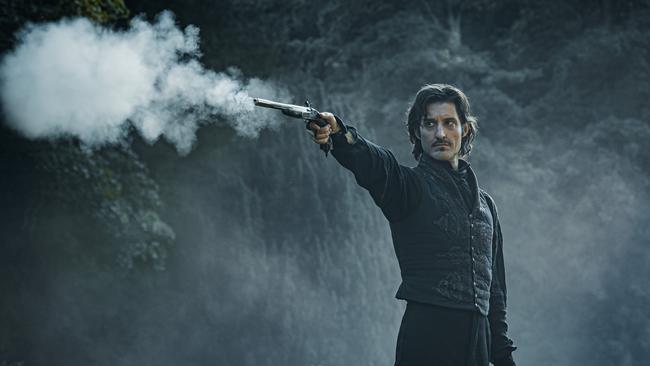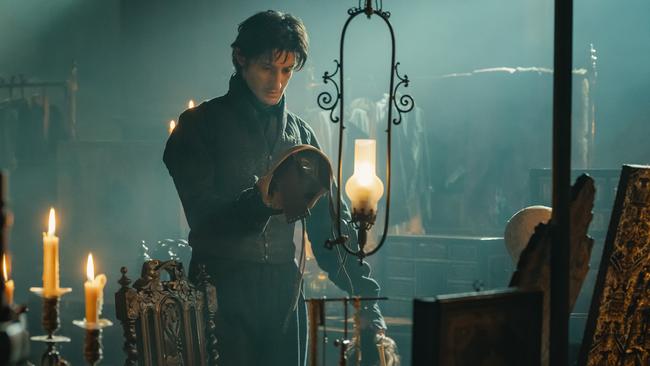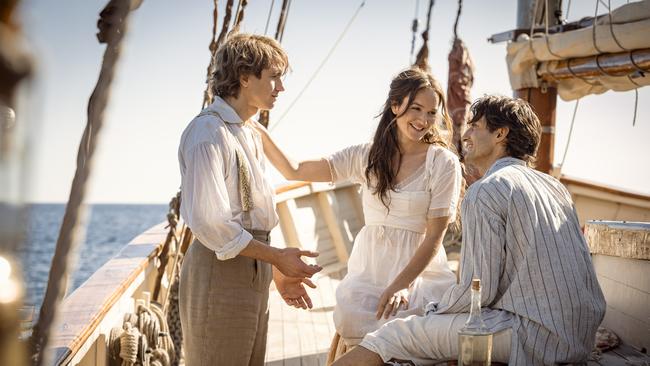The Count of Monte Cristo review – an absolute pleasure
This spirited adaptation of Alexandre Dumas’ 1844 novel is almost three hours long yet passes in a heartbeat.

The Count of Monte Cristo (M)
178 minutes
French language with English subtitles
In cinemas
Four stars
The epic 19th-century French drama The Count of Monte Cristo is a spirited adaptation of Alexandre Dumas’ 1200-page novel of 1844. It’s almost three hours long yet passes in a heartbeat.
The heart is at the centre of a cracking story that takes in thwarted romance, wrongful imprisonment, friendship and betrayal, a buried child, a buried treasure, a master of disguise and, above all, revenge.
“Don’t worry. I’ll be back my love,’’ Edmond Dantes (a perfect Pierre Niney, with a swallow tattooed above each pectoral) tells his beloved, Mercedes (Anais Demoustier), when he is arrested and hauled off from the church in which they are about to be married.
It’s 1815 and Napoleon Bonaparte is exiled on the island of Elba. Dantes, a sailor, rescues a woman, Angele (Adele Simphal), from the sea. She has on her possession a letter from the former emperor.
Her part in the story, and her relation to the other main characters, will become important.

The captain of the ship, Danglars (Patrick Millle), accuses Dantes of being a Napoleonite, the equivalent of being a terrorist back then.
The accusation becomes a conviction and Dantes is sent to a hellhole of a prison.
Right now I need to add a spoiler alert for anyone who hasn’t found time to read Dumas’s novel in the past 181 years.
In the subterranean jail Dantes becomes friends with an older man (Pierfrancesco Favino) who educates him. “History, philosophy … they are weapons,’’ he advises, and Dantes comes to learn that he is right.
He also swears that he knows the location of an unclaimed treasure on the Italian island of Monte Cristo.
The two plan an escape. The time in prison is superbly captured by cinematographer Nicolas Bolduc, as is the rest of the film. It is glorious to look at.
Long story short, Dantes becomes the titular count and is out for revenge or, as he prefers to call it, justice.
“I am but the armed agent of fate, deaf and blind.”
He’s after the captain who dobbed him in, his old friend Fernand (Bastien Bouillon), who fancied Mercedes, the prosecutor (Laurent Lafitte) who had him sent down, and others.

All the performances are first rate.
When the count, in disguise, first meets Mercedes, there is a suggestion, in her eyes, that she knows who he is.
Later he tells her, “My reason struggled, not my heart’’.
This film is a modern incarnation of an old-fashioned spectacular.
It’s an absolute pleasure to watch. It’s written and directed by French filmmakers Matthieu Delaporte and Alexandre de la Patelliere.
Their previous project was writing the 2023 two-part adaptation of Dumas’ The Three Musketeers, directed by Martin Bourboulon and shot by the same cinematographer.
They know and love their Dumas. I wonder if, Down Under, we can say the same about Patrick White.



To join the conversation, please log in. Don't have an account? Register
Join the conversation, you are commenting as Logout